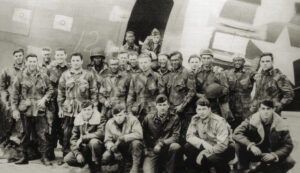Snow was falling as a railroad engine from Washington, D.C., clanged to a stop at Salem, Virginia, on the evening of November 7, 1862. Brigadier General Catharinus P. Buckingham stepped from the cab, borrowed a horse and, riding with an escort, traveled 15 miles to Orleans and the headquarters of Major General Ambrose Burnside. Sent by the War Department, Buckingham delivered a written order to Burnside.
Burnside read the letter and voiced objections to its contents at once. At the direction of President Abraham Lincoln, the order read, Maj. Gen. George B. McClellan was relieved of command of the Army of the Potomac, and Burnside was assigned to the post. A close friend of McClellan, Burnside had refused the command a few months earlier. If he did not accept it this time, Buckingham told him, it would be tendered to Joseph Hooker. Burnside, who disliked Hooker, reluctantly accepted the command. He confided later to a fellow officer, “I don’t feel equal to it.”
Later that night, Burnside and Buckingham delivered the order to McClellan at his headquarters in Rectortown. When McClellan read it, he said, “Well, Burnside, I turn command over to you.” At Burnside’s request, he agreed to remain with the army a few days to discuss its deployment and current operations.
McClellan had led the army for slightly more than 15 months. Brought to the capital after First Bull Run, he had been heralded as the “Young Napoleon.” He had christened the army, organized its units, drilled, disciplined and supplied its ranks while instilling pride and fighting spirit in its soldiers. The men called him “Little Mac,” and most remembered him affectionately long after his dismissal.
McClellan’s tenure, however, had been steeped in controversy. He had feuded with Lincoln, General Winfield Scott and Secretary of War Edwin Stanton. In private letters to his wife, he scornfully criticized the administration, blaming it for what he perceived as repeated failures to reinforce the army. A social and political conservative, McClellan believed in a limited war and had opposed the Emancipation Proclamation.
The major source of difficulty between the general and the president had been McClellan’s slowness in committing the army to offensive operations. His caution and inflated estimates of Confederate manpower had crippled him as an army commander. Lincoln had urged him time and again to act. No other general so tested the president’s patience as did McClellan.
During the first week of October 1862, Lincoln visited the army at Sharpsburg, Md., where it had won a strategic victory on September 17. Two weeks prior to the Battle of Antietam, Lincoln reluctantly, and with opposition from some Cabinet members, had re-elevated McClellan to the role of principal field commander in the East by returning the large portion of his army that had been sent to Maj. Gen. John Pope. Lincoln removed Pope after the rout at Second Bull Run and folded his Army of Virginia into the Army of the Potomac. Now, however, Lincoln had come to judge the army’s condition and to confer with McClellan. During their private conversations, Lincoln told him that he would be “a ruined man if he did not move forward, move rapidly and effectively.”
When Lincoln returned to Washington, he ordered McClellan to “cross the Potomac and give battle to the enemy or drive him south,” adding, “Your army must move now while the roads are good.” Instead McClellan delayed, citing shortages in manpower, supplies and ammunition. Finally, on October 26, the army began crossing the Potomac River into Virginia. While the Federals lumbered south, Lincoln bided his time until the midterm elections on November 6 were complete. In the canvasses the Democrats won 34 seats in the House of Representatives, two governorships and majorities in some state legislatures, including Lincoln’s Illinois. The next day he issued the order for McClellan’s removal and Burnside’s appointment.
Lincoln said that he had tired of trying to “bore with an auger too dull to take hold.” To a secretary, he explained his decision: “I began to fear he [McClellan] was playing false—that he did not want to hurt the enemy. I saw how he could intercept the enemy on the way to Richmond. I determined to make that the test. If he let them get away I would remove him. He did so & I relieved him.”
The news of McClellan’s dismissal “broke upon us like a thunder clap,” declared an officer. Anger boiled up from the ranks, with some members arguing that the army should march on the capital and demand McClellan’s restoration to command. Most of the men concluded, however, “that we were fighting for the country, and not for any individual.” Some troops shed tears as McClellan departed.
Ironically, McClellan never seemed to appreciate the prowess of the weapon that he had forged. His shadow lingered over the army’s senior leadership for many months, but the conflict had passed him by. Abraham Lincoln had told Congress that he hoped the war would not “degenerate into a violent and remorseless revolutionary struggle.” But the president also knew that victory would require “hard, tough fighting.” A fall snowstorm carried change with it.
Originally published in the December 2006 issue of Civil War Times. To subscribe, click here.




